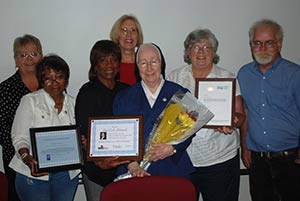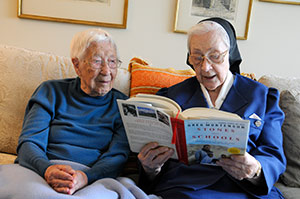Twenty years ago, School Sister of Notre Dame Sr. Cecile Lubniewski signed on to be a Senior Companion, visiting the elderly through a Milwaukee County Social Development Commission (SDC) program.
 School Sister of Notre Dame Cecile Lubniewski, pictured above with Interfaith and Social Development Commission staff, was honored recently for her 20 years of volunteer work helping homebound seniors through the Senior Companion Program, a national program coordinated in Milwaukee County by the Social Development Commission. It is funded in part by the Corporation for National and Community Service and the State of Wisconsin. (Submitted photo courtesy the Social Development Commission)Two decades later, she’s still at it, making regular visits, providing friendship and support to Milwaukee County’s homebound, five days a week. By the way, Sr. Cecile is 90 years old, herself, but doesn’t let age get in the way of helping others.
School Sister of Notre Dame Cecile Lubniewski, pictured above with Interfaith and Social Development Commission staff, was honored recently for her 20 years of volunteer work helping homebound seniors through the Senior Companion Program, a national program coordinated in Milwaukee County by the Social Development Commission. It is funded in part by the Corporation for National and Community Service and the State of Wisconsin. (Submitted photo courtesy the Social Development Commission)Two decades later, she’s still at it, making regular visits, providing friendship and support to Milwaukee County’s homebound, five days a week. By the way, Sr. Cecile is 90 years old, herself, but doesn’t let age get in the way of helping others.
The Senior Companion Program connects homebound seniors with members of the community to provide companionship and assistance with household tasks.
Early on in her relationship with the seniors she visits, Sr. Cecile learns the other person’s likes and dislikes in order to better connect with them.
“I try to get them to talk about something close to their heart,” said Sr. Cecile. This can include family or religious customs the client may practice, or hobbies, such as cooking.
When Sr. Cecile visits Evelyn Stenson, 102, the two women share stories about their past work in education. Sr. Cecile was a principal for many years and Stenson was a teacher. Because her eyesight is too poor to clearly read, Stenson enjoys having someone read to her.
“I look forward to the day she comes to visit,” said Stenson, a part of the program for about a year.
Senior Companions, unlike home health care or respite services programs, concentrates on the social component missing from many elderly people’s lives. Someone may be there to assist them with medical needs, but few have family or friends readily available with whom they can talk and connect.
Sr. Cecile understands this.
“I have to go give the best I can,” she said. “They’re waiting for something.”
Every week Sr. Cecile visits five homebound seniors. Some live with family or a caregiver, some do not. All have varying interests. She spends about four hours School Sister of Notre Dame Cecile Lubniewski, 90, reads to Evelyn Stenson, 102, at her Wauwatosa home on Thursday, Oct. 4. Sr. Cecile was recently honored by the Social Development Commission and the Interfaith Older Adult Program for 20 years of volunteer service through the Senior Companion Program. (Catholic Herald photo by Ernie Mastroianni) with each client, sometimes more, if needed.
School Sister of Notre Dame Cecile Lubniewski, 90, reads to Evelyn Stenson, 102, at her Wauwatosa home on Thursday, Oct. 4. Sr. Cecile was recently honored by the Social Development Commission and the Interfaith Older Adult Program for 20 years of volunteer service through the Senior Companion Program. (Catholic Herald photo by Ernie Mastroianni) with each client, sometimes more, if needed.
Sr. Cecile still drives each day to visit her clients. Senior Companions, such as Sr. Cecile, typically stay with the same client until they move away or seek hospice care.
The program is free. There are also no financial requirements to receive the care from the program. Many of the clients also receive some type of home health care assistance.
With programs such as this, residents are able to stay in their homes longer than they would otherwise, said Bill Meunier, project assistant for the Senior Companion Program. In some instances, the Senior Companion was so important to the client that they were listed in their obituary.
Stenson said the visits are beneficial for her caregiver, who is able to get some time away while Sr. Cecile visits.
Sr. Cecile said the program has helped her stay young.
“I like what I’m doing. I feel like I’ve done something for someone,” she told your Catholic Herald.
The nun has created lasting friendships with many of her clients, some even for 18 years.
Sr. Cecile, who is celebrating 70 years as a School Sister of Notre Dame, also took care of her aging parents. Thankful for that experience, she now uses her compassionate skills to help others.
Meunier talked of one client who said she always wanted a sister, and with the addition of Sr. Cecile’s visits, she now feels like she has one, even though it’s not the “sister” she originally hoped for.
After 20 years in the Senior Companions program, many have asked Sr. Cecile when she is going to stop visiting the homebound.
“As long as I can drive, I’ll do it,” she said. “I really thank God that I got this job.”
The Senior Companions program started at the federal level in 1974. Different sites around the country, including Milwaukee County’s SDC, were selected to host the program. Today, the Senior Companion Program is a national program and is funded by the Corporation for National and Community Service and the State of Wisconsin.
Meunier said studies have shown that volunteers tend to live longer.
“The program helps the companions as much as it helps the clients,” Meunier said.
Meunier spoke of several incidents he’s seen in the program. One client had such severe arthritis she was unable to write. However, with the patience and instruction of her Senior Companion, she learned to knit and make jewelry. Not only did this give the client a new hobby, but it also gave her passion and confidence in her abilities.
“The Senior Companion learns from the client, and vise versa,” said Mattie Payne, project manager of the Senior Companions Program.
A survey of Milwaukee County found that more than half of those 65 and older live alone, according to Payne.
Also, many of Milwaukee’s elderly live in poverty. The program, therefore, also helps seniors sign up for public assistance.
The program has 67 companions, and is looking to recruit more. Each typically serves three to five clients.
During their visits, the participants assist in everyday household tasks, shopping, attending doctors’ visits and other transportation needs.
Many of the clients are at-risk of moving to a nursing facility. This program’s efforts hope to assist seniors with staying in their homes as long as possible. In fact, in 2010, the SDC reported that it served 512 seniors, which saved approximately $53,196 per year for each client who was able to live independently in his or her home.
A Senior Companion must be at least 55 years of age, since the goal of the program is to act as a peer and confidant for those they are serving. The Senior Companion also must be unemployed or retired. They cannot do this job while working another job, especially one that would affect the hours they could visit clients.
Benefits to the program include a tax-free stipend that does not affect other benefits that the person is receiving and reimbursement for mileage or bus fare. Senior Companions also receive paid training throughout their time in the program.
